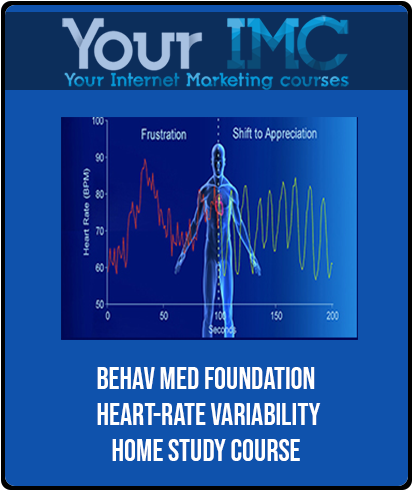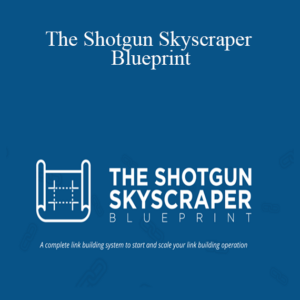[Download Now] Behav Med Foundation – Heart-Rate Variability Home Study Course
PLEASE REFER TO OUR PROOF : WATCH HERE!
Behav Med Foundation – Heart-Rate Variability Home Study Course
Salepage: http://www.behavmedfoundation.org/heart-rate-variability-recording-and-feedback/
Archive: View
Ph.D.
Read Bio »
Concept:
At home learning format based on audiovisual lectures, readings, and both live and email interactions with the instructor. You can start anytime up to three months after purchasing the course and can work with the instructor for up to one year after the purchase date when the course expires. This course meets the requirements for BCIA’s certificate in heart rate variability (HRV). It emphasizes methods for evaluation and modification of autonomic quieting through heart rate variability training. Topics covered include (1) Cardiac anatomy and physiology, (2) Respiratory anatomy and physiology, (3) Autonomic nervous system anatomy and physiology, and (4) Heart rate variability psychophysiology, instrumentation, measurement, biofeedback strategies and applications.
You will learn by watching audiovisual lectures provided on the course web, reading assignments both from materials provided on the course web site, watching a movie, and interacting extensively with the instructor via e-mail and, if you wish, by phone. You will answer short essay questions rather than taking exams. Previous students have required between 20 and 35 hours of work to complete this course. There are no prerequisites for this course but having previously taken a course in anatomy and physiology makes the material in this course easier to understand and relate to the rest of the body’s functions.
Specific Course Objectives: As a result of taking this course, you should be able to:
- Have knowledge of each topic (listed below) required to earn the Biofeedback Certification International Alliance’s (BCIA’s) certificate in Heart Rate Variability Biofeedback.
- Understand how basic cardiac anatomy and physiology (A&P) relate to HRV.
- Be able to determine your own resonance frequency and calculate it for others.
- Have sufficient knowledge of respiratory A&P to relate it to HEV.
- Understand how the autonomic nervous system’s A&P cause changes in organ system functioning.
- Be able to use standard biofeedback instruments to measure, assess, and feedback HRV.
- Be able to train people to change their HRV through biofeedback.
Format:
Home study supported by e-mail chats after each unit is completed. The course is divided into a series of units based on organ systems. You will progress through each unit by watching an introductory audiovisual lecture on the course web site about an organ system followed by reading one or more chapters in the required book, text files on the course web site and, if you are using one or more of them, possibly in one of the optional books. After watching the lecture and reading the assigned material, you will answer a brief series of questions located in the review question file on the course web site. The answered questions are then e-mailed to the instructor. You and the instructor will discuss each unit via e-mail or phone after your answers are assessed. You do not have to wait for the discussion to proceed to the succeeding lecture & chapters. You are more than welcome to spend extra time with the instructor discussing topics related to the course and biofeedback in general. The cost of the texts is not included in the course fee.
Accessibility: Hearing impaired people can view the slides only as virtually all of the material presented in the lectures is typed onto the slides. Visually impaired people can concentrate on the verbal lectures as the slide material is repeated in the lecture accompanying each slide.
Required Equipment
To take this course you must have access to a biofeedback system capable of measuring respiration and HR simultaneously, with an on-line spectral analysis display of some sort. Acceptable systems include J&J, Thought Technology, Nexus, and Biocomp. If you have a different system, contact the instructor prior to purchasing the course. The HeartMath and Stress Eraser devices are not sufficient, nor are various smart phone applications, although all of these can be used clinically.
Computer and Computer Knowledge Requirements:
Anybody with a modern computer and a bit of basic understanding of computer operation (at the level of being able to send e-mails) can play this course with minimal problems. You must have a computer (a) capable of connecting to the internet and running a typical internet program, (b) containing/running a modern word processor such as Microsoft word or Word Perfect, (c) the capability to play sounds such as music (has speakers and appropriate software which normally come with any modern computer), and (d) a slide viewing program such as Power Point (you can probably get a slide viewing program free off the internet if you don’t have one). Any modern (e.g., built within the last ten years), IBM style computer running Windows 98 and more recent platforms (e.g., XP or Windows 8) should be able to do this. Speed, hard disk size, and RAM are not factors for computers in the above category.
Hundreds of students have used recent Apple products (MACs etc.) for the Foundation’s courses. However they frequently have more difficulty playing the course materials than PC users do. If you are using a MAC type of computer, you must have a current version of “quicktime”. If you do not have it, you can download it for free from the web.
Faculty:
The course is given by Dr. Paul M. Lehrer, Ph.D. He is Professor of Psychiatry at the UMDNJ?Robert Wood Johnson Medical School. Dr. Lehrer has published hundreds of studies many of which established the basics of HRV and its biofeedback based interventions. He has been president of the field’s professional organization – The Association for Applied Psychophysiology and Biofeedback (AAPB) – and currently chairs its sister research support organization. Full CV available upon request and on the course web site.
Topic Outline:
I. Cardiac Anatomy & Physiology (1 hour)
A. How the ECG is generated
B. Sympathetic and parasympathetic influences
C. Heart-brain interaction.
II. Respiratory Anatomy & Physiology (1 hour)
A. The functions of breathing
B. The respiratory cycle
C. Muscle involvement in breathing
D. The Bohr effect
E. Functional and dysfunctional breathing behaviors
III. Autonomic Nervous System Anatomy & Physiology (.5 hour)
A. Three autonomic branches
B. The vagus nerve
IV. Heart Rate Variability (2 hours)
A. The meaning of HRV
B. The sources of HRV
C. Factors that influence HRV
D. Correlates of low and normal HRV
E. The benefits of increased HRV
V. HRV Instrumentation (3 hours)
A. Blood volume pulse (BVP)
(1. Source, 2. PPG sensor, 3. Signal, 4. Placements, 5. Tracking test, & 6. Artifacts)
B. The electrocardiogram (ECG)
(1. Source, 2. ECG sensor, 3. Signal, 4. Placements , 5. Tracking test, & 6. Artifacts)
C. Pneumograph
(1. Source, 2. sensor, 3. Signal, 4. Placements, 5. Tracking test, & 6. Artifacts)
VI. HRV Measurements (2 hours)
A. Time domain measurements and their meaning, properties, and correlates
B. Frequency domain measurements and their meaning, properties, and correlates
C. Brief versus 24-hour Holter monitoring
D. How to interpret HRV measurements
VII. HRV Biofeedback Strategies (4 hours)
A. How to explain HRV biofeedback to a client
B. How to assess breathing
C. How to measure the resonance frequency
D. How to teach resonance frequency breathing
E. How to structure an HRV biofeedback training session
F. How to augment training with emotional regulation strategies
G. HRV biofeedback side effects and contraindications
H. Practice assignments to promote generalization
VIII. HRV Biofeedback Applications (1.5 hours)
A. Clinical applications
B. Optimal performance applications
IX You aren’t quite done yet.
Fill out (1) the Foundation’s course evaluation form and (2) the BCIA evaluation form (MS Word file named “A&P BCIA evaluation form”) and send it to BCIA ([email protected])
When all requirements have been successfully completed, your course completion certificate will be e-mailed to you and BCIA will be informed that you completed the course.
Administrative Information
Schedule:
You can start the course whenever wish to within six months of the purchase date and work at your own pace as long as you complete the course within one year of purchase. Just contact us at [email protected] or (800) 530-6658 to get started.
Duration of course validity:
You must begin the course within six months of the purchase date and complete it within one year of the purchase date. Courses not completed by that time are void and must be repurchased if still available. No refunds are provided for courses not completed within one year of purchase.
CE Credit:
These are continuing education, not university accredited, courses. The Behavioral Medicine R&T Foundation is approved by the American Psychological Association to sponsor continuing education for psychologists. The Behavioral Medicine R&T Foundation maintains responsibility for this program and its content.
BCIA:
This course is accepted by the Biofeedback Certification International Alliance for certification and recertification continuing education.
Payment, Refund, Scholarship, and cancellation policies:
Full payment for each course is required before access to the course is provided. Payment is by credit card though our web site’s secure ordering section or by check in US dollars made out to the Foundation and sent to the address below. Full refund will be made until students are given access to the course materials. After getting access to the course materials there is no refund at all as the Foundation has committed its resources to you and you have access to all of the course materials. A course would only be cancelled due to an extreme emergency on the part of the course instructor or the Foundation. In the highly unlikely event a course is cancelled, you would receive a full refund.
Scholarships:
The Foundation gives scholarships consisting of 25% off the cost of the course(s) to (a) students and professionals (e.g. clinicians, coaches, teachers) from emerging nations and (b) full time graduate students in developed nations.
Course updates:
Updates to all courses are placed on the course web site as they are made. Students are informed when updates are available.
Questions / further information?
Contact Dr. Richard Sherman (director of the psychophysiology CE and doctoral programs) at [email protected] or (360) 452-5020.
Delivery Method
– After your purchase, you’ll see a View your orders link which goes to the Downloads page. Here, you can download all the files associated with your order.
– Downloads are available once your payment is confirmed, we’ll also send you a download notification email separate from any transaction notification emails you receive from coursesblock.com
– Since it is a digital copy, our suggestion is to download and save it to your hard drive. In case the link is broken for any reason, please contact us and we will resend the new download link.
– If you cannot find the download link, please don’t worry about that. We will update and notify you as soon as possible at 8:00 AM – 8:00 PM (UTC 8).
Thank You For Shopping With Us!






![[Download Now] 2 Girls Teach Sex – Extreme Female Orgasms](https://coursesblock.com/wp-content/uploads/2024/10/2-Girls-Teach-Sex-Extreme-Female-Orgasms-imc-1-300x300.png)

